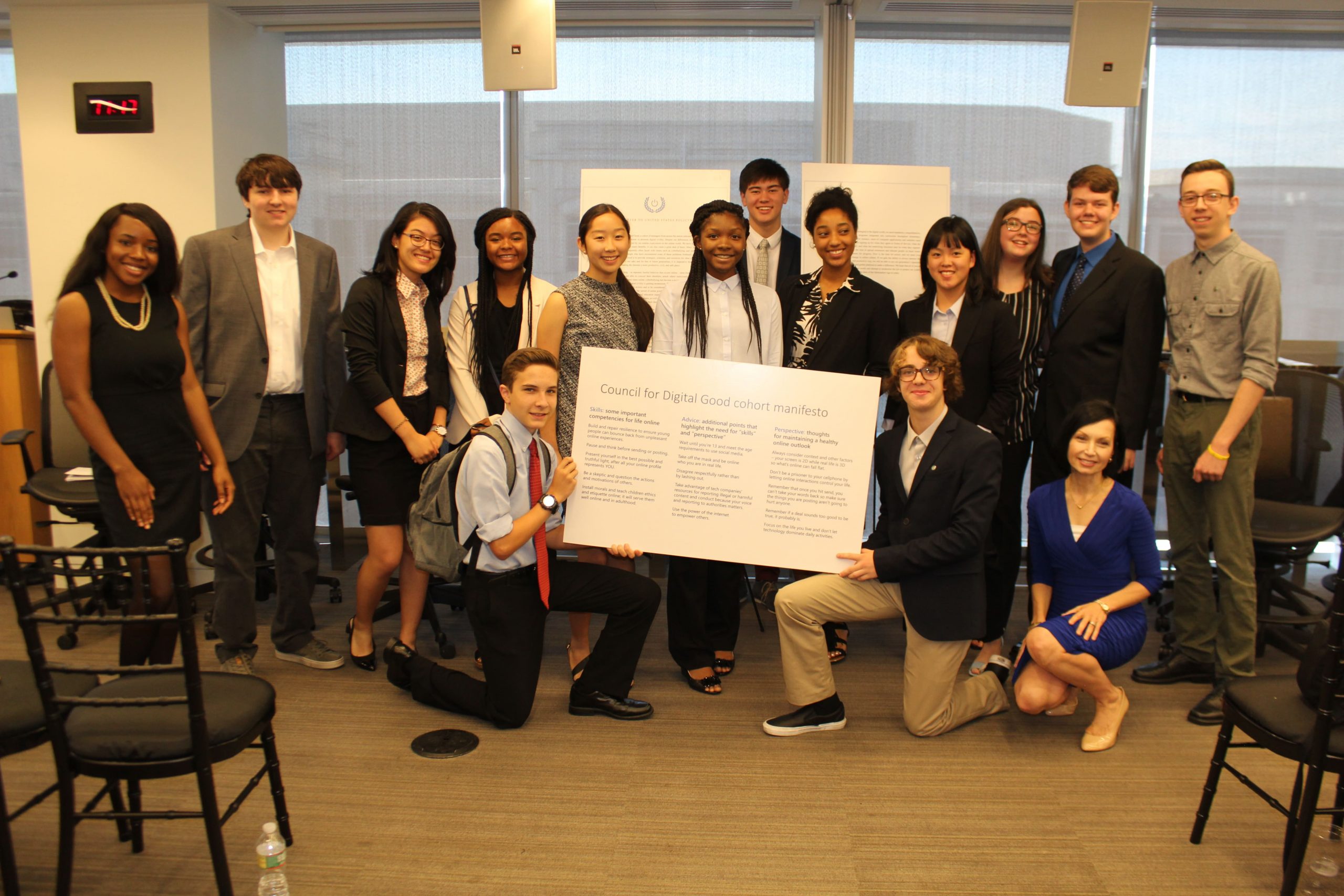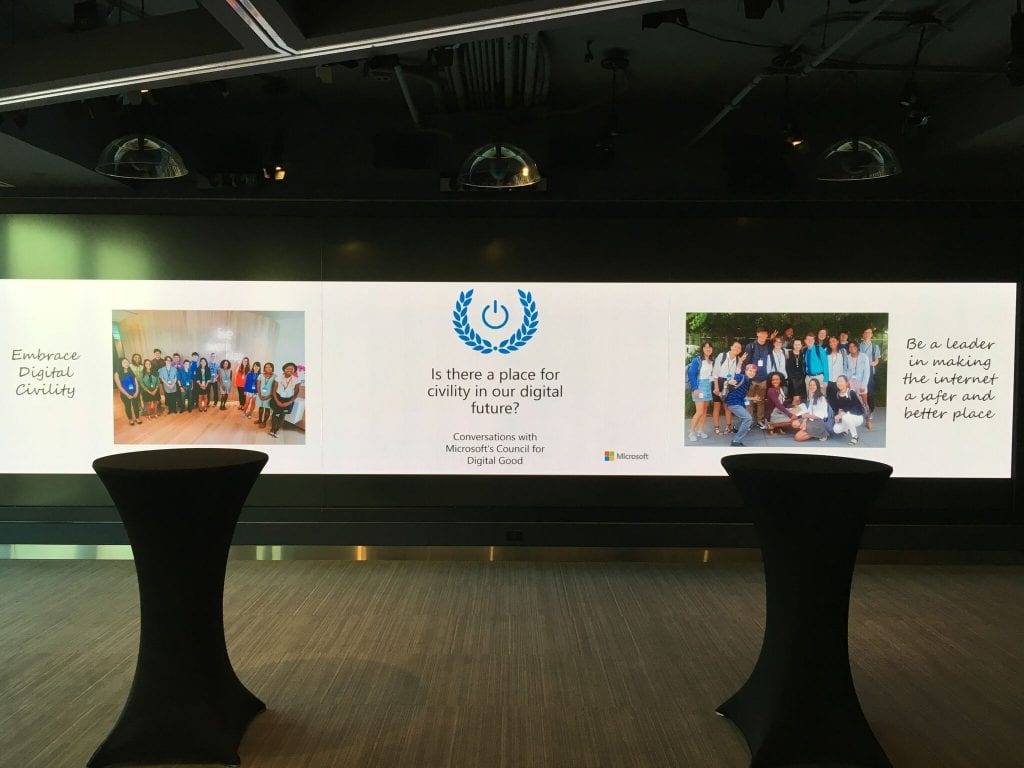It’s been a month since our inaugural Council for Digital Good met in Washington, D.C., to unveil an open letter to law- and policymakers about improving life online which was a culmination of the teen council’s work over the past 18 months. While I summarized the event and the open letter in a blog post last month, I wanted to share more details about the council’s time in D.C., as well as a few thoughts on the pilot program overall.
Our July event consisted of two panel discussions led by the teens and focused on the state of online civility today and what we hope for in the future. During the first panel, four teens shared what they discussed with peers, parents and their broader communities at various workshops and discussion groups that they led on and around international Safer Internet Day in February. We then asked three adult panelists to react to and question the teens about what they’d presented. Representatives from Google, Columbia University and Born This Way Foundation responded with praise, feedback and a few thought-provoking questions. Here are a few highlights:
Teens stress awareness-raising, education and communications
- Jazmine, a 14-year-old from Kentucky, stressed the need for awareness-raising of online risks and formal, in-school education about online safety and digital civility. “There’s no silver-bullet solution to protecting kids online,” she said. “I want to offer my feelings of empowerment to other students.” That’s why going forward, Jazmine is committed to leading activities in her school and school district on Safer Internet Day every year. We look forward to Jazmine’s progress, as well as the responses from her peers, teachers and others.
- Judah, a 14-year-old from Tennessee always brought a unique perspective to our discussions because Judah does not have technology or social media. We selected Judah for the council for his somewhat atypical teen experiences and he shared some of those in D.C. As we at Microsoft also often note, Judah said age limits exist on social media for a reason. “If you’re not abiding by them, you’re not helping yourself.”
Judah also spoke of the need for parents to model good digital behavior in front of their children and teens. “When a kid sees a parent on the phone, it’s a competition for (the parent’s) attention: the kid versus the cellphone.” Judah said young people immediately start asking questions of the parent, seeking permission for one thing or another. “Kids actually want the parent to say no” because that would mean the parent was truly listening and paying attention to them. In addition to addressing a fourth-grade class on Safer Internet Day 2018, Judah joined his parents‘ online safety program and organization, Parents Who Fight, at four other informational events they’ve held this year.
- Asked what more might be done to connect positively with young people about online safety and the need for digital civility, Christina, a 17-year-old from Georgia, said high-schoolers are “set in their (digital) ways,” and will likely be more difficult to reach with proactive messages. “Until something happens to them, kids think they’re immune” from online ills. Christina also noted that young people fear judgment and punishment from their parents for risky online behaviors, so she suggested “no condescension” when coaching kids through online life. Following the event, Christina was approached by a D.C.-based nonprofit to write a guest blog about her council experience and she’s been offered an internship opportunity with another nongovernmental organization. (More on this discussion and the entire D.C. event when we post some new videos to our YouTube channel.)
Council members share their unvarnished views
Our second panel featured six teens, three discussing the cohort’s written manifesto for life online released in January, and three others presenting the open letter. Introducing the written manifesto, Sierra, an 18-year-old college student from North Carolina, highlighted the need for resilience-building in young people, mindfulness and digital civility – all key ingredients for helping to reduce exposure to online risks and abuse.
Highlighting the importance of reporting concerns to technology companies about content and conduct on their services, the young people said they’d like to receive acknowledgement emails from companies that the teens’ reports were received and are being addressed. They also noted the need for tech firms to promote awareness within their individual products and services that reporting illegal and abusive material and activity is warranted, necessary and useful. We first discussed reporting terms-of-use violations with the teens at our Redmond, Wash., summit last August. Initially, we didn’t seem to be connecting with the teens on the topic, but over the course of the next several months, the youth clearly gave some thought to the issue. In fact, during the D.C. forum, William, a soon-to-be high-school junior from Washington state, admitted, “I didn’t even realize I had these opinions until someone asked to hear them.”
Indeed, we wanted others to hear firsthand what these impressive teens have been learning and clearly internalizing for at least the last 18 months. The opinions and perspectives that they shared in D.C. and throughout the council program were their own and those of others in the cohort. Even when drafting the open letter, we at Microsoft provided only directional guidance and feedback. We wanted clarity of thought and authenticity to shine through with our group, so we made it a point of requiring only two things: active participation and timely completion of assignments. How members went about accomplishing their work – individually or as a full council – was up to them. And, we emphasized open dialogues, the sharing of experiences and focus group-style interactions.
Most importantly, and being mindful of a comment from one applicant, we treated our council members like the informed and interesting young adults that they are. In her application, one council member said that she had opinions and she wanted adults to hear and listen to them. Again, the impact of the event in D.C. and that of the entire program underscores the importance of the youth voice and the need for young people to have a say in policy matters that affect them.
Dr. Sameer Hinduja, co-director of the Cyberbullying Research Center and professor of criminology at Florida Atlantic University, followed the council’s progress online and was energized to learn of its next steps.
“It is so encouraging to see that the students – while aware of the breadth and scope of online risks and vulnerabilities out there – are motivated to find and implement solutions among their peer groups and communities,” Hinduja said. “Interestingly, the best strategies to positively change attitudes and actions of youth online aren’t rooted in technology, but in the development of character traits such as grit, gratitude, empathy, integrity and emotional self-regulation. These youth clearly know this and will now move to translate their ideas into actionable efforts that have the potential to change their generation’s ‘default’ approach to social media use into one marked by thoughtfulness, inclusivity and kindness.”
Although this inaugural pilot program formally concluded following our D.C. event, many of the individual council members are joining other organizations to continue to learn, grow and advocate for these critical societal issues. We’ll be sure to follow up with a ‘Where they are now’ post in a few months.
Learn more
In the meantime, you can read the council’s full open letter here and learn more about digital civility at www.microsoft.com/digitalcivility. For more about online safety generally, visit our website and resources page; “like” us on Facebook and follow us on Twitter.
At the time of writing of this post, Jacqueline Beauchere’s title was Chief Online Safety Officer.


